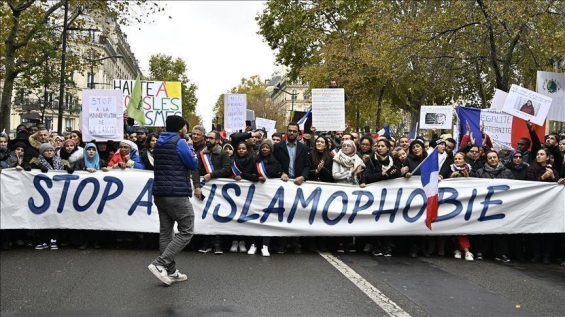The controversies surrounding Muslims have been a recurring theme in public debate in France for years. These discussions have become increasingly crude and even absurd, to the point of blaming Muslims for shortages of oil (2024) or eggs (Ramadan 2025). However, these ongoing debates, endlessly repeated by many media outlets, obscure a much more worrying reality: Islamophobia is being denied to better render it invisible.
Several members of parliament, notably Sabrina Sebaihi (EELV) and Sébastien Delogu (LFI), have criticized the toxic political and media atmosphere in France during the first National Assembly session dedicated to anti-Muslim hatred. Sebaihi emphasized that the work carried out by the parliamentary commission, supported by dozens of hearings, is clear: discrimination against Muslims is a proven fact.
L’#islamophobie n’est pas un débat d’opinion, c’est une mécanique d'oppression.
— Sabrina Sebaihi (@SabrinaSebaihi) March 26, 2025
Et tant qu’elle gangrène notre République, notre devise, “Liberté, Égalité, Fraternité”, est trahie. #DirectAN pic.twitter.com/ZCuY2t5f59
However, the term «Islamophobia» itself continues to spark debates, often diverted to avoid addressing the core issue. While some institutions prefer to refer to «anti-Muslim acts» the majority of those affected embrace the word «Islamophobia», as it captures a reality of rejection and hostility toward a community perceived primarily through the lens of its religion.
Sebaihi pointed out that, contrary to popular belief, the term was not coined by authoritarian religious regimes but emerged in France at the beginning of the 20th century. It is part of a historical continuum, inheriting anti-Maghreb racism linked to colonization and perpetuated by dangerous conflations between Islam and terrorism.
A Hostile Political and Media Climate
While the far right bears primary responsibility for this stigmatization, it is not alone. Some political leaders, including those at the highest levels of government, contribute to fostering a climate of constant suspicion. The denunciation of so-called «Islamist separatism» often serves to legitimize discriminatory measures under the guise of secularism, while some ministers do not hesitate to speak of a «regression to ethnic origins» when discussing certain French citizens.
Chaque jour, une nouvelle polémique vient humilier les Français musulmans, jusqu’au plus haut sommet de l’Etat.
— Sébastien DELOGU (@sebastiendelogu) March 26, 2025
Aujourd’hui, quelle différence y a-t-il entre le conseil des ministres et les plateaux de BFM ou de CNEWS ? pic.twitter.com/boUVc5VUvd
In the French media, Islam and immigration have become obsessions. In 2023, CNews dedicated news banners to these topics for over 335 days out of 365, Sebaihi recalls. These anxiety-inducing narratives, amplified by social media, shape a biased perception that translates into actions: racial profiling, hiring discrimination, dress code restrictions, and, more broadly, the increasing exclusion of Muslims from public spaces.
Secularism as a Tool for Exclusion
The principle of secularism, originally meant to guarantee freedom of conscience, is now being twisted to justify targeted restrictions. «After the ban on headscarves in sports, tomorrow it might be Muslim schools that are threatened», warns Sebaihi. While some private Catholic schools operate without hindrance, others, like Al-Kindi in Lyon or Averroès in Lille, face institutional obstacles.
This shift marks a worrying turning point: «Secularism no longer emancipates, it excludes!» Worse still, it becomes a weapon to render Muslims invisible, forcing them to choose between their faith and their citizenship.
The numbers speak for themselves: in Europe, one in two Muslims reports being a victim of discrimination. In France, this phenomenon is underreported due to a lack of trust in institutions. Many Muslims, weary of this hostile environment, are considering leaving the country. This alarming trend raises questions about the future of the republican project.





 chargement...
chargement...













